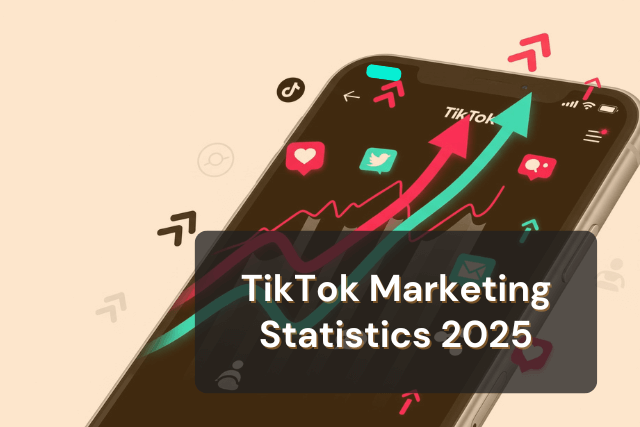



TikTok’s explosive growth shows no signs of slowing in 2025. In just a few years, this short-form video app has evolved from a Gen-Z phenomenon into a mainstream marketing channel used by brands of all sizes. Marketers are flocking to TikTok to reach its massive user base and capitalize on sky-high engagement rates. How big is TikTok now, and what results can businesses expect on the platform?
Here are the latest TikTok marketing statistics and insights for 2025 to help you understand the platform’s audience, usage habits, and advertising impact.

TikTok is now one of the world’s largest social networks. As of 2025, TikTok boasts around 1.59 billion monthly active users globall, making it the fifth most popular social platform (after Facebook, YouTube, Instagram, and WhatsApp). The app has been downloaded over 5.48 billion times, reflecting its worldwide reach. In the United States alone, TikTok’s audience has swelled to about 135–150 million users – the largest TikTok user base of any country.
Other nations with huge followings include Indonesia and Brazil. In fact, TikTok is so pervasive in some regions that its user penetration exceeds 100% of the adult population (e.g. an estimated 138% in Saudi Arabia, due to multi-account usage), while in the U.S. nearly 50% of the adult “digital” population is on TikTok.
This shift underscores how TikTok’s content algorithm helps users discover information, trends, and products in a very engaging way. 92% of global TikTok users take some action after watching a video – whether it’s liking, sharing, following, or searching for more info. In other words, the vast majority of viewers are not passive; they interact and respond to content. From a marketing standpoint, this is gold. TikTok isn’t just reaching people – it’s prompting them to engage.
TikTok’s staggering growth has also come with business success for its parent company, ByteDance. TikTok (including the Chinese version Douyin) generated about $23 billion in revenue in 2024, up 43% from the year prior. Much of this comes from advertising, but TikTok also became the first non-gaming app to top $6 billion in in-app purchase revenue (largely via gifts and coins on TikTok Live).
App downloads remain strong too – TikTok saw 186 million installs in Q4 2024 alone, and historically hit a quarterly peak of 313 million downloads in early 2020. All these stats point to one conclusion: TikTok in 2025 is a dominant force in the digital landscape, and its influence on consumer attention is unmatched.
Notably, TikTok also reaches an audience that you won’t find on other social networks. An estimated 25% of TikTok users are unique to the platform (they don’t use Facebook, IG, etc.). That means if your brand isn’t on TikTok, you could be missing a quarter of TikTok’s audience entirely. Marketers have taken notice – TikTok has become a fixture in modern social media strategies.

With such a massive and engaged user base, TikTok is delivering real results for brands, marketers, and creators. Below are some of the most compelling TikTok marketing statistics and trends of 2025:
TikTok’s signature short-form videos are extremely effective at capturing attention. Marketers report that videos under 1 minute tend to achieve the best engagement rates, aligning with TikTok’s rapid-fire content style. In fact, despite some reports of a slight decline in average engagement metrics over the past year, TikTok still boasts the highest engagement rate of any social platform at around 2.65% on average.
For context, that outperforms Instagram, Twitter, and Facebook by a wide margin. TikTok’s total watch time also surged by 71% in 2024, indicating users are watching more content for longer. For marketers, this means well-crafted TikToks have a strong chance of being seen and interacted with.
TikTok has become a powerful engine for product discovery and e-commerce. 71% of TikTok users say they discovered new products on TikTok that they hadn’t seen elsewhere. The app’s viral trends and algorithmic feed can rapidly introduce users to new brands and items. Crucially, this discovery is translating into purchases.
Roughly 33% of TikTok users have bought a product after seeing it on TikTok, according to surveys. And it’s not just impulse buys: around 39% of all consumers’ purchases (across various surveys) were influenced by TikTok in some way – an astonishing figure that speaks to TikTok’s role in shaping consumer behavior. TikTok’s own shopping features are gaining traction as well; over 11% of U.S. households have made a purchase on TikTok Shop (the app’s e-commerce marketplace).
Even TikTok LIVE streams convert viewers into customers – fully half of TikTok users have made a purchase after watching a live video on the app. These stats underscore that TikTok isn’t just for awareness or engagement; it can directly drive sales and revenue.
It’s not only big brands benefiting from TikTok marketing – small and medium businesses are seeing major impact, too. According to data compiled in 2024, 88% of small businesses reported that TikTok promotions led to higher sales for their business. Many of these are local or niche businesses that found a new customer base through viral TikTok content. In certain industries, the revenue attributable to TikTok is remarkable.
For example, TikTok helped small businesses in the food and beverage sector generate an estimated $6.4 billion in revenue last year by driving hungry viewers to try new restaurants, recipes, and products. The takeaway for 2025: brands of all sizes should consider TikTok as a sales channel. A creative TikTok video or challenge can level the playing field and reach millions, often without huge ad budgets.
TikTok’s advertising platform has matured significantly, offering various ad formats (In-Feed ads, Branded Hashtag Challenges, Spark Ads, etc.) and targeting options. Marketers are finding that TikTok ads can deliver strong results cost-effectively. The average cost-per-click (CPC) on TikTok is only about $0.22 across campaign types – relatively low, allowing even modest budgets to reach many users. And those ads are paying off: on average, advertisers get about $2 in revenue for every $1 spent on TikTok (a 2:1 return on ad spend).
Certain campaign objectives perform exceptionally well on TikTok. For instance, “traffic” campaigns (driving clicks to a website) see the highest click-through rates (67% of all ad clicks come from traffic campaigns), and video view campaigns tend to generate the most impressions. Video view campaigns are so engaging that they also have a higher average CPC (~$6, suggesting that advertisers are willing to pay more for views).
Notably, TikTok’s ad reach is huge: it’s estimated that TikTok ads can reach 13.6% of the world’s population (many hundreds of millions of people). TikTok’s global ad revenue is projected to hit $17+ billion in 2024, reflecting heavy investment from advertisers. Yet, users don’t seem turned off by TikTok ads – perhaps because many ads on TikTok feel native or entertaining.
Consistently advertising on TikTok can even boost brand trust by 41% among viewers (likely because seeing a brand repeatedly on TikTok lends credibility and familiarity). The key for marketers is to create TikTok ads that match the platform’s authentic, creative style.
TikTok is very much a creator-driven platform, and brands that partner with popular TikTok creators or influencers often see outsized benefits. Statistics show that ads featuring TikTok creators yield a 26% higher brand favorability among audiences, meaning people feel more positive about the brand after seeing a creator endorse or incorporate it.
Similarly, brand recall for ads can increase by ~27% when a TikTok influencer is involved. Perhaps most impressively, working with creators dramatically boosts view-through rates – by up to 193% in some cases (essentially, people are nearly three times more likely to watch your ad through to the end if it includes a trusted creator).
Influencer marketing on TikTok clearly strikes a chord, likely because TikTok creators know how to engage their fans in an organic, entertaining way. It’s also worth noting that TikTok uniquely influences shoppers via creator content: 67% of TikTok-using women shoppers say they rely on creator recommendations to decide what to buy.
Many users see their favorite TikTok personalities as trendsetters or advisers, so a mention or review from a creator can directly drive sales. In 2025, leveraging the creator community – whether through paid influencer campaigns, creator licensing of content, or TikTok’s Creator Marketplace – is a savvy move for brands looking to maximize ROI.
TikTok’s evolution includes a growing emphasis on live streaming and interactive video features, which present new marketing angles. 64% of TikTok users prefer watching live content on the app, showing that TikTok Live has a substantial audience. Brands have taken notice by doing live product demos, Q&As, or event streams on TikTok.
The interactivity of live video (with real-time comments and shopping integrations) can deepen engagement. As mentioned, half of users have made purchases after TikTok Live sessions, underlining how effective live commerce can be. Beyond live video, TikTok also rolled out features like polls, quizzes, and AR filters for ads – all aiming to increase user participation.
In a platform where trends like challenges and duets thrive, interactive content is king. Marketers in 2025 are wise to create campaigns that invite users to join in (e.g. hashtag challenges) or to experience content in real-time (live streams), as these tend to generate buzz and community involvement.
Overall, the 2025 landscape of TikTok marketing is one of enormous opportunity. The platform’s user numbers and engagement levels are unparalleled, and it’s influencing culture and commerce in equal measure. Video content on TikTok can rapidly go viral, propel products to sold-out status, or turn unknown brands into household names overnight.
The data shows that when brands get it right – with content that feels native to TikTok, collaboration with creators, and a finger on the pulse of trends – the outcomes can be game-changing. From boosting brand awareness and trust, to driving direct sales and ROI, TikTok has proven its value as a marketing channel.
In 2025, TikTok stands as one of the most influential marketing platforms, backed by massive reach, unmatched engagement, and clear ROI. With over 1.6 billion users and the highest average engagement across social media, it’s no longer optional for brands—it’s essential. The data proves that TikTok drives awareness, product discovery, and real sales, especially when paired with authentic content and creator partnerships.
For marketers and creators aiming to stand out, consistency and clarity in video delivery are key. Tools like teleprompter apps can help streamline production by keeping messaging on point without sacrificing authenticity. With TikTok continuing to shape marketing trends globally, now is the time to create with intention—and get in front of an audience that’s ready to act.
References:
DemandSage: Trending Statistics
Investopedia: TikTok: What It Is, How It Works, and Why It's Popular
The Social Shepherd: 25 Essential TikTok Statistics You Need to Know in 2025
DemandSage: How Many People Use TikTok 2025 [Active Users]
DataReporta: Digital 2025: Saudi Arabia
Magnet ABA Therapy TikTok Statistics, Facts & User Demographics
Metricool: 50 TikTok Statistics in 2025 for Social Media Marketing
TechCrunch: Google exec suggests Instagram and TikTok are eating into Google’s core products, Search and Maps
Pew Research Center: Social Media and News Fact Sheet
StatsUp: TikTok Statistics (2025)



